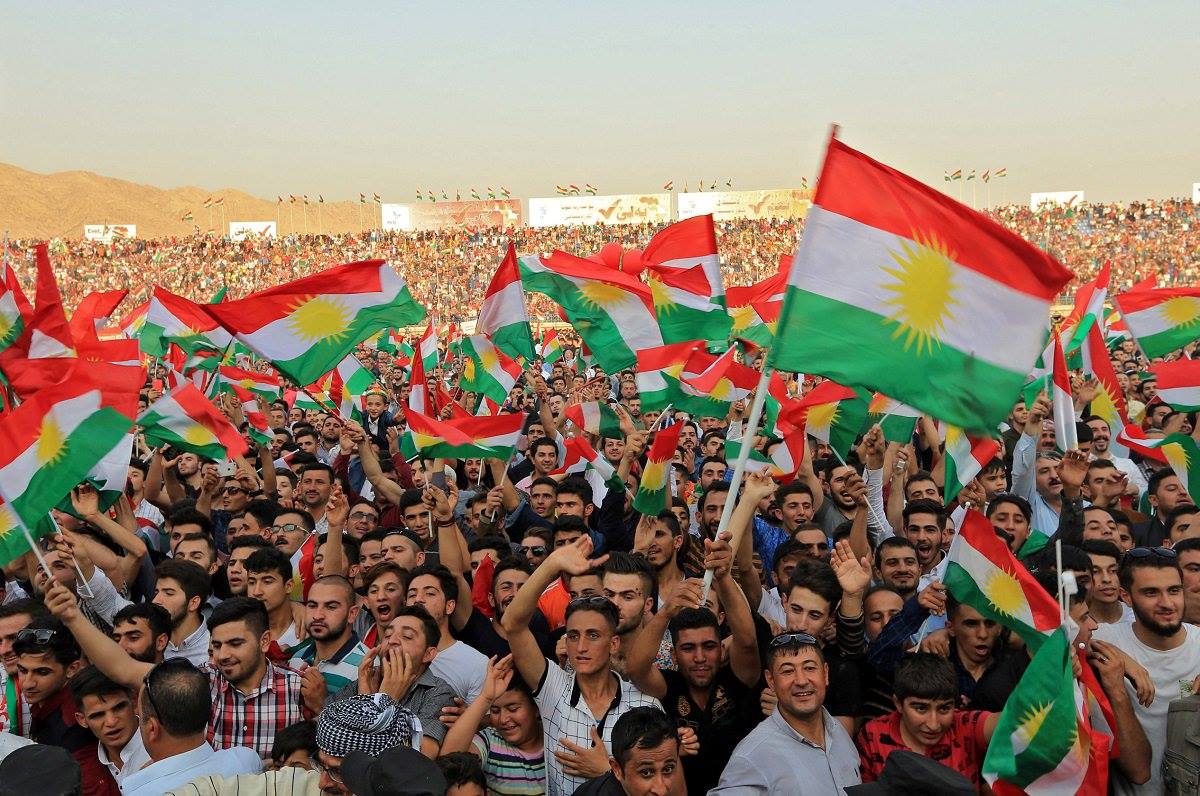Every flower that sprouts in the mountains had to first break through a rock.
By. Dr. Thoreau Redcrow. Published 9-22-2017 by the Region

Rallies and celebrations take place throughout Kurdistan as the referendum vote approaches Monday’s date.. Photo: Al Arabiya/Twitter
In a few days on September 25th the autonomous Kurdish Regional Government (KRG) of Southern Kurdistan / Bashur (i.e. northern “Iraq”) is set to hold a non-binding aspirational referendum on their region’s independence. For many of the 6+ million Kurds of Bashur it is undoubtedly a day they have dreamt of or longed for; perhaps even a chance which seemed all but a fantasy through the billowing smoke of chemical bombs in Hełebce, or Saddam’s mass graves of the 1980’s.
Moreover, although this referendum is only related to one of the four regions of Greater Kurdistan—leaving those 20+ million Kurds of southeastern Turkey (Northern Kurdistan), 12 million Kurds of northwestern Iran (Eastern Kurdistan), and 2-3 million Kurds of northern Syria (Western Kurdistan) awaiting their own eventual ‘independence day’—I have still anecdotally witnessed a surge in Kurdish patriotism and excitement throughout wider Kurdistan and the diaspora at the possibility that the first of the four dominoes may finally fall.
That doesn’t mean however that there aren’t a range of obstacles and challenges facing such an attempted endeavor. For starters, the KRG’s proposed referendum has very few international backers, with the only nations thus far stating they aren’t categorically against it being Russia, France, and Israel. However, those calls have been drown out by the irate decrees of the KRG’s foes and supposed friends, who have all denounced the move for regional self-determination as everything from illegitimate to illegal.
For instance, Iraqi Prime Minister Haider al-Abadi—whose nation’s army cravenly fled ISIS’ initial Mosul assault in 2014 and left the Kurds to fend for themselves—said the referendum would lead to “dangerous consequences” to the “public peace”, while Turkey’s dictator Tayyip Erdoğan—whose regime has jailed hundreds of thousands of Kurdish activists and routinely murders Kurdish children in cratered basements—opined that the democratic referendum was, “a threat to the territorial integrity of Iraq and is a wrong step.” For his part, Ayatollah Ali Khamenei, highlighted the Iranian Mullah’s opposition, arguing that the referendum was against the “identity of Iraq.” Now while the latter two objections are self-evident, what seems to be missing from both autocrats’ suppositions is why the Kurds of Southern Kurdistan would even rationally desire to remain a part of Iraq in the first place?
For starters, historically there was no country of “Iraq”; it was arbitrarily created by the British and concocted by Gertrude of Arabia in 1921. As such, artificial colonial creations for the purpose of Western resource extraction are by definition usually unstable, and require authoritarian rulers to hold them together and preserve the continued (now neocolonial) pillaging. Saddam Hussein (who ruled Iraq from 1979-2003) was great at the former, but in the 1990’s stopped serving his role in the latter—hence he was ‘replaced’ with the hopes that Western corporations may “liberate” more of Iraq’s oil for themselves (while giving the Iraqi people new superficial freedoms like satellite dishes and cell phone options, with the occasional Baghdad-based mass car bombing). As such, it became clear to the U.S. from 1991 onwards that “northern Iraq” or “Iraqi Kurdistan” (even though the only thing ‘Iraqi’ about it were the Ba’athist torture prisons), was an oasis of relative stability compared to the rest of the country, and so it was protected by a U.S. no-fly zone and allowed to blossom into a comparatively thriving place before the rise of ISIS. Which begs the question, why would the Kurds of Southern Kurdistan even want to be in the same government as Baghdad and those who tried to wipe them out through genocide during the 1980’s? Well, fast-forward to today, and the differences are even starker, where you will find that central Iraq is mostly a deserted ISIS-ravaged wasteland, while southern Iraq has essentially become a corrupt satellite of Tehran.
Now while it may be understandable that the nations which have historically occupied and brutally repressed the Kurds are sour on their prospects for independence, what is morally inexcusable is that a supposed ally of the KRG such as the United States would foolishly oppose an independent Southern Kurdistan. The reasoning of course is to sheepishly please their NATO ‘ally’ and repressive ethnocracy Turkey, who has their own “Kurdish problem” and fears the future ultimate Kurdish grand prize of an independent Northern Kurdistan / Bakur (home to at least half of all the world’s Kurds). But that is exactly what should happen, as all indigenous people have the inalienable right to be free of military occupation and fulfill their own self-determination and sovereignty.
As a disappointing example of the aforementioned U.S.’ inglorious stance towards the referendum, American diplomat Brett McGurk—who I would psychoanalyze sees himself as a new-age ‘Lawrence of Arabia’ (with all the orientalist cringe that such a title confers)—said at a recent press conference in Hewlêr that, “This referendum is ill-timed and ill-advised. It is not something that we can support.” McGurk also went on question the legitimacy of the referendum, stating that in his view, “There’s not international support for the referendum really from anybody. To have a legitimate process, you want to have observers; you want to have the United Nations.” What Mr. McGurk didn’t answer however, is why the people of Southern Kurdistan should even care or need the permission of the outside world in fulfilling their own destiny.
Not to be outdone, the Trump White House’s Press Secretary disseminated their own shameful nobody-asked-you-anyway statement on September 15th, which read:
“The United States does not support the Kurdistan Regional Government’s intention to hold a referendum later this month. The United States has repeatedly emphasized to the leaders of the Kurdistan Regional Government that the referendum is distracting from efforts to defeat ISIS and stabilize the liberated areas. Holding the referendum in disputed areas is particularly provocative and destabilizing. We therefore call on the Kurdistan Regional Government to call off the referendum.”
The fact that the United States government would have the chutzpah to accuse the KRG of creating a distraction that would assist ISIS, while consistently ignoring NATO ally Turkey who has a long documented history of arming, aiding, and abetting ISIS as a proxy force against the Kurds of Rojava from 2014 on, is itself insulting enough, to say nothing of the fact that the U.S. State Department should not be the arbiter of which people can possess their own independence.
Now, are there legitimate internal concerns and obstacles to Southern Kurdistan becoming independent? Of course, and those shouldn’t be overlooked. But the people that should be democratically weighing the risks and rewards of those variables are the Kurdish people themselves, not The White House or Western diplomats who will fly back to their comfort and safety while the Kurds deal with the real-life consequences of voting yes or no in any referendum. Plus there is no reason to believe that most of Bashur’s structural issues would be alleviated by keeping the center of power in a hostile Baghdad rather than Hewlêr—to say nothing of the fact that most nations with U.N. recognized status possesses many of the same supposed impediments.
For example, some of those Southern Kurdistan challenges include: landlocked geography, a struggling economy, corruption, nepotism, political patronage, lack of a strong civil society, wealth inequality, an influx of refugees, increasing food prices, power cuts, ghost workers, unpaid Peshmerga salaries, a bloated public sector, near-bankruptcy or insolvency, and political infighting between the KDP / PUK / Gorran. You also have the concerning issue of Turkish military bases around Dihok and the possibility that Shia militias may attack the oil-rich ‘Kurdish Jerusalem’ of Kerkûk to prevent Kurds from fully reclaiming that city which Saddam tried so hard to ethnically purge.
However, despite all of these problems, the greater risk in my estimation to the Kurds of Southern Kurdistan would be voting “No” and allowing the other three neighboring states who each want to keep their own Kurdish populations from achieving cultural rights, autonomy, or eventual independence (i.e. Turkey, Syria, & Iran) to disingenuously say, “See, we told you so, all of this time we weren’t stifling Kurdish desires, they don’t really want to control themselves anyway.” Because as contemporary history has proven, there is nothing that Ankara, Tehran, Baghdad, and Damascus fear more than when Kurds are emboldened, inspired, and united. And although the numbers would vary depending on the borders, a future independent Greater Kurdistan of all four regions would have between the 36th (at 40 million) and 45th (at 30 million) largest population of all nations on Earth (more than 75% of the 195 representatives at the U.N. and a higher total population than Iraq).
Now, I realize that some Kurds disagree with the referendum entirely (and that is of course their right), but I would leave those non-Kurds—especially in the U.S. government—with the words of Bese Hozat, the Kurdish female KCK co-leader whose coalition don’t believe the referendum will be a full solution for the region or even philosophically have faith in bourgeois nation states, but support it on principle anyway, who said:
“A referendum is a natural and democratic right of the people’s, regardless of its aims. The Kurds in the four parts of Kurdistan are entitled to their right of self-determination and also to their right for a free life in Kurdistan.”
Perhaps if The White House wants to learn a lesson on what democracy really means, they should follow the lead of those Kurdish guerrillas unfairly listed on their bogus ‘terrorist list’.
Biji Kurdistan! On September 25th or whenever it may fully come.
About the author
Dr. Thoreau Redcrow, known to his Kurdish friends as ‘Soro’ (Red), is an American Global Conflict Analyst and Kurdish Studies Scholar with a Ph.D. in Conflict Analysis and Resolution. He conducted his doctoral research embedded with KCK guerrillas throughout Greater Kurdistan.
This article is republished with the author’s permission.

